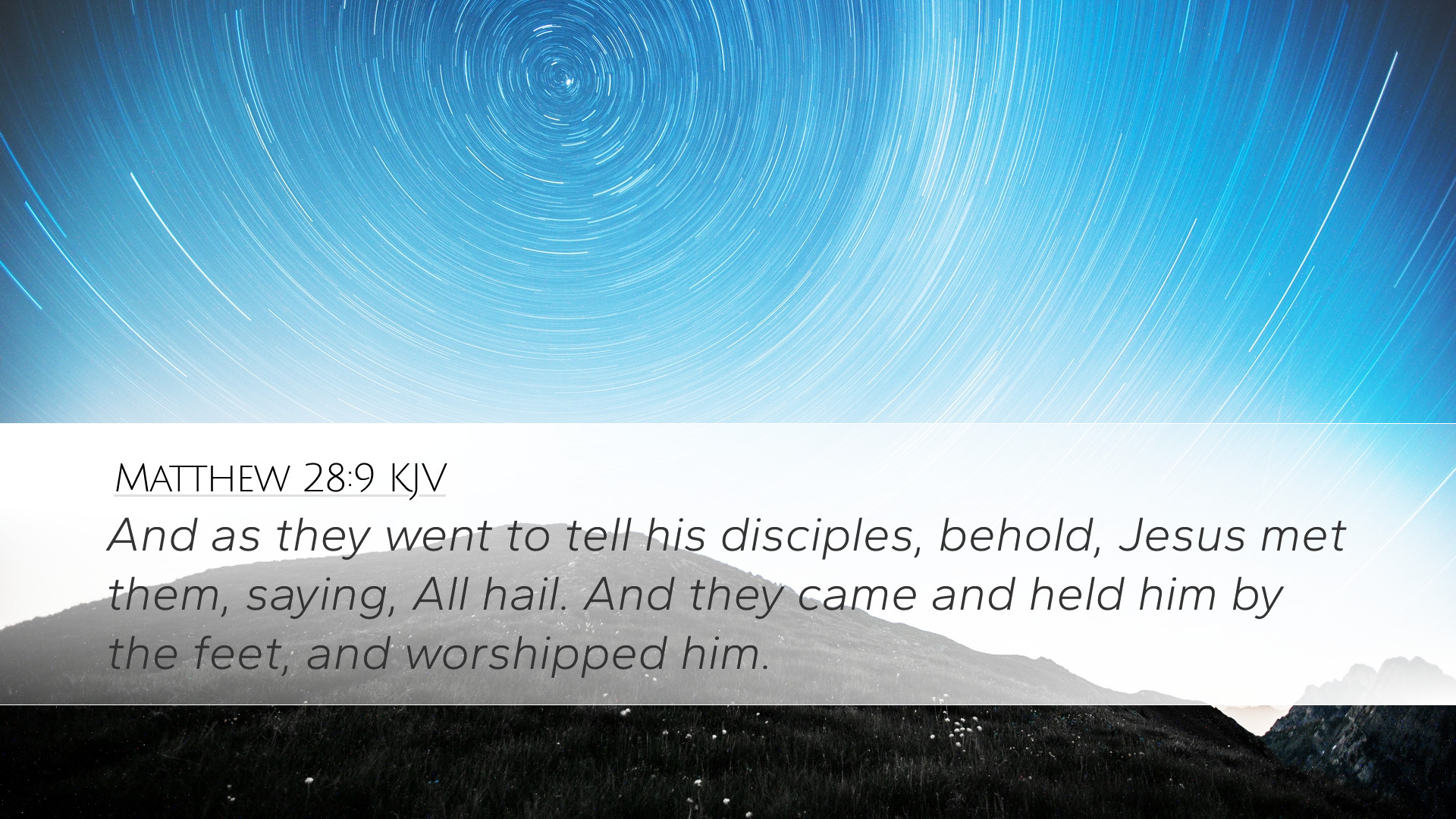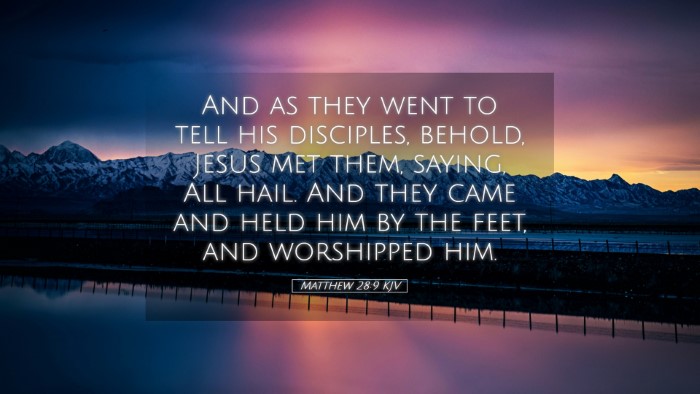Commentary on Matthew 28:9
Verse Context: The verse Matthew 28:9 states: "And as they went to tell his disciples, behold, Jesus met them, saying, All hail. And they came and held him by the feet, and worshipped him." This account is situated in the context of the resurrection of Jesus, a pivotal moment in the Christian faith.
Introduction
This commentary aims to explore the rich theological implications of Matthew 28:9, drawing insights from the esteemed works of Matthew Henry, Albert Barnes, and Adam Clarke. Each of these commentaries contributes valuable perspectives that enhance our understanding of the resurrection encounter with Jesus.
The Significance of Jesus' Appearance
Matthew Henry's Perspective: Henry emphasizes the personal nature of Jesus' resurrection appearances. To the women, their encounter with Jesus was both a fulfillment of His promise and a confirmation of His divine authority. Henry notes that the greeting "All hail" serves not only as a salutation but as an affirmation of Jesus’ victory over death.
Albert Barnes' Insights: Barnes highlights the remarkable nature of this revelation, observing that Jesus chose to appear first to the women who had come to anoint His body. This choice underlines the value of women in the Gospel narrative and serves as a profound lesson in humility and grace.
Adam Clarke's Understanding: Clarke emphasizes that the word "hail" (or "rejoice") conveys joy and serves as an invitation to the women to celebrate the resurrection. His commentary reinforces the idea that this encounter transforms despair into hope, showcasing the central theme of resurrection joy integral to Christian belief.
Worship in Response to Revelation
The women’s response—holding His feet and worshipping Him—is a critical aspect of the narrative.
- Henry's View on Worship: Henry discusses how their action signifies devotion and recognition of Jesus' divine status. The act of physically holding His feet symbolizes submission and reverence, representing true worship.
- Barnes' Reflections: Barnes notes this act of worship affirms Jesus' lordship and highlights the importance of recognizing and responding appropriately to divine majesty. The act of worship also serves as a model for believers in their relationship with Christ.
- Clarke's Commentary on Worship: Clarke points out that worship stems from the acknowledgment of profound truth. The women's recognition of Jesus as risen Lord transforms their fear into faith, which Clarke views as essential to the Christian experience.
The Role of Faith and Witness
Matthew 28:9 serves as a key moment of commissioning for the women, who are soon sent to inform the disciples of the resurrection.
- Henry's Conjecture on the Mission: Henry notes that their encounter with Jesus empowers them for mission. They become the first witnesses to proclaim the resurrection, a task of profound significance that calls upon all believers to bear witness to Christ's transformative power.
- Barnes on the Nature of Testimony: Barnes contemplates the importance of their testimony, asserting that it serves as an authenticating factor for the disciples' faith. The women’s firsthand experience lays the groundwork for the apostolic message about the resurrection.
- Clarke on Spiritual Significance: Clarke argues that the transformative encounter equips the witnesses with deep spiritual insight, emphasizing that the nature of their witness is rooted in personal experience rather than mere secondhand knowledge.
Theological Reflections
This verse offers profound theological implications that pertain to the incarnation, resurrection, and the nature of Christ’s authority.
- The Incarnation and Resurrection: Each commentator reflects on how Christ's resurrection validates His incarnate mission. It affirms His identity as the Son of God, encouraging believers to find assurance in their faith (Henry).
- The Nature of Authority: Barnes discusses that the resurrection establishes Jesus' authority over life and death, signifying that His message is not only powerful but also divinely validated.
- The Resurrection and Hope: Clarke stresses that the resurrection not only confirms Christ's divine nature but also offers hope to all believers, signifying victory over sin and death.
Conclusion
Matthew 28:9 encapsulates a moment of deep significance that resonates through the ages. The personal encounter with the risen Christ, the act of worship, and the mission given to the first witnesses together affirm the core tenets of Christian faith. The insights drawn from the thoughtful commentaries of Matthew Henry, Albert Barnes, and Adam Clarke unveil a multilayered understanding of resurrection—one that invites continuing reflection and deeper study among pastors, students, theologians, and scholars alike.


